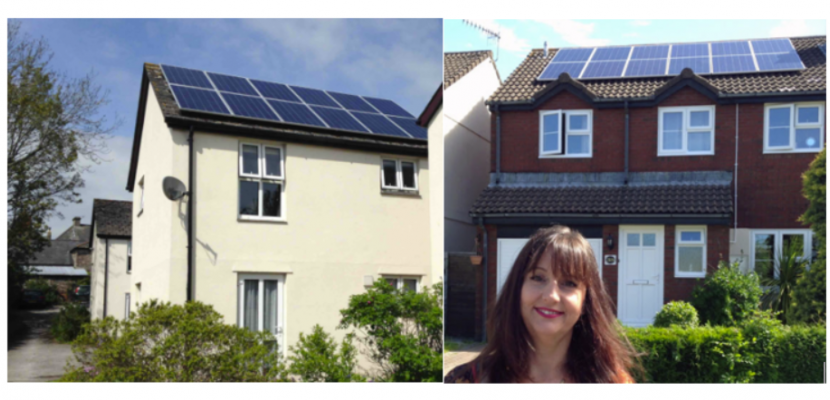Image

Shine Social Housing Project: Solar PV Installation in a Local Housing Association in Devon, UK
Published on 25 May 2021

United Kingdom
Devon
This is the good practice's implementation level. It can be national, regional or local.
About this good practice
Project aimed at tackling rural energy poverty in Devon, UK, where levels are around the UK average of 11%, and the second highest average fuel poverty gap of the UK regions (money required to reach the threshold for fuel poverty). Contributors include a low-wage economy, lack of affordable housing, high percentage of rural households and growing elderly population.
Installation of 607 solar PV on 40 South Devon Rural Housing Association (SDRHA) households (which houses predominantly lower-income or vulnerable people, including those at risk of fuel poverty), a 25-bed care home and the SDRHA’s HQ, funded by Totnes Renewable Energy Society (TRESOC - a Devon-based community investment fund for renewable energy projects) and SDRHA.
The installations benefited from the UK Government’s feed in tariff which guaranteed a set income for each unit of electricity generated for 20 years, which pays for the panels, whilst
tenants of the homes benefit from reduced energy costs. If people generate their own renewable electricity, they can apply for payments from their energy supplier for each kWh of electricity generated. Generators of electricity can sell half of their units back to the grid for 0.06 Euro per unit.
TRESOC also provided tenants with information about the need for and benefits of clean energy, by having in-depth discussions and printed information leaflets.
Installation of 607 solar PV on 40 South Devon Rural Housing Association (SDRHA) households (which houses predominantly lower-income or vulnerable people, including those at risk of fuel poverty), a 25-bed care home and the SDRHA’s HQ, funded by Totnes Renewable Energy Society (TRESOC - a Devon-based community investment fund for renewable energy projects) and SDRHA.
The installations benefited from the UK Government’s feed in tariff which guaranteed a set income for each unit of electricity generated for 20 years, which pays for the panels, whilst
tenants of the homes benefit from reduced energy costs. If people generate their own renewable electricity, they can apply for payments from their energy supplier for each kWh of electricity generated. Generators of electricity can sell half of their units back to the grid for 0.06 Euro per unit.
TRESOC also provided tenants with information about the need for and benefits of clean energy, by having in-depth discussions and printed information leaflets.
Expert opinion
This good practice shows that private investments to boost the uptake of renewable energy technologies can be successfully stimulated by public support mechanisms (‘feed-in tariffs’ - FIT) that enable a return of investment and that simultaneously have the effect of lowering energy prices for households. FIT and feed-in premiums (FIP) e.g. in the form of grants and bonuses were the main support schemes that drove the large-scale deployment of renewable technologies in the European electricity sector so far. Such measures were adopted by almost all EU countries and the results achieved in the UK as exemplified in the case at hand are remarkable: other local and regional policymakers may certainly take advantage of existing public support mechanisms for the uptake of renewables and be inspired by the use of community investment funds to finance the installation of solar PV panels with the purpose of addressing energy poverty in rural areas.
Resources needed
Upfront investment. funded by TRESOC’s community investment fund and SDRHA for the solar panels. Local companies to provide installation/care of PV and data analytics. UK Gov Feed-in tariff to provide payback on investment.
Evidence of success
85 tonnes CO2 reduced/year across the project, generating 148,000kWh of electricity/year. Based on a 15p/kWh cost, combined energy savings for residents could be 15,590 €/year. 40 low-income households in the region benefitted & increased knowledge & involvement in the energy generation process. 70% of participants saw a reduction in their energy bills. Awarded the Regen (a non-profit centre of energy expertise and market insight based in the UK) South West Green Energy Community Award in 2015
Potential for learning or transfer
High replicability due to easy model; upfront investment, paid back from fixed feed in tariffs, and low, fixed electricity costs for tenants. Use of local businesses and investment means that profits of the scheme benefits the local economy and local people, it is a win:win scenario. However, it requires a government feed-in tariff to guarantee the return on investment.
Further information
Website
Good practice owner
You can contact the good practice owner below for more detailed information.
Organisation
TRESOC (Totnes Renewable Energy Society)

United Kingdom
Devon
Contact